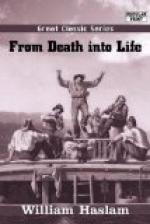The Dismissal, 1860-61
Of this work at Hayle was not “a success,” in every sense of the word, I do not yet know what success in parochial ministry is. If large congregations may be counted; many communicants taken into reckoning; with frequent services, and schools full of children—we certainly had these. But above all, we had a continual ingathering of souls, who will testify throughout eternity of the blessedness and reality of the work of God during the time I was there.
It so happened that as we approached the term of three years, of which I had been premonished when I first came, that my dear friend, Mr. Aitken, came to pay us a visit. He preached with more amazing power than ever. His appeals were altogether overwhelming, and I do not wonder that the people fell on their knees, as they did then and there, and cried aloud for mercy.
A newspaper reporter who came to hear this “great man” preach, was at first observed to be writing very diligently; then he paused, and his hand fell; then his pencil and book went from his grasp; presently he himself fell on his knees, and began to cry for mercy. We were curious afterwards to read his report.
In it the grateful man acknowledged his indebtedness, and the blessing he had received. As to the sermon, he likened it to one of the storms of the great Atlantic. He said. “At such a time it is interesting to stand on the shore and watch the sea, and to note the power of wind and waves while the storm is raging. Even then it is sometimes terrific enough; but how much more so when the wind veers and the mighty waves come rolling in one after another, and breaking with tremendous force upon the rocks on which we stand! So it was with this preacher. All eyes were fixed on him when he gave out his text, and proceeded with his usual introduction. Now and then he alarmed and roused us with the power of his oratory; but when he turned to apply his subject to the consciences of the people, he became irresistible. Immediately, there was heard on all sides a cry for mercy. The stentorian voice of the preacher was audible above all others as he went on to apply the Word with unrelenting force, till very few hearts, however hard, remained unbroken.”
This was a memorable day with us. Twice was the church filled and emptied; and again a third time, in the evening, the people crowded in and filled the place. Far into the night we wrought amongst the anxious and broken-hearted, bidding them to look at the Crucified One and live.
Mr. Aitken was not a man who raked cinders over the fire, but rather raked them off and that in true kindness and love; but with terrible and awful plainness he showed the danger of trifling with the Gospel, and presuming upon God’s love and forbearance.




